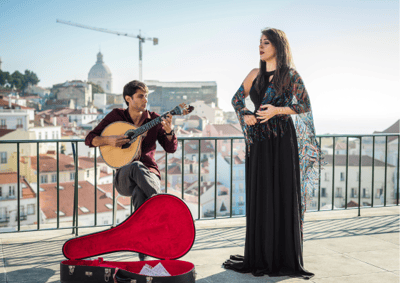Fado
/ in fado, Fado portugal, fado music / by smadar PalaceIn Portuguese the word “Fado” means fate or destiny. Perhaps that’s why this enchanting and traditional folk music of Portugal is so enticing. The dulcet tones and the often relatable lyrics settle over the human experience of life in all of us.
Fado is uniquely Portuguese but, beyond Portugal, fado is often an unknown genre. Rest assured we’re going to resolve that as we explore the history, culture and meaning behind this bluesy folk music that fills the air throughout Lisbon, Coimbra and most of Portugal.
The Birth of A Tradition
The rustic and residential neighborhoods around Lisbon serve as the birthplace of Fado. This captivating folk music is believed to have originated in the early 1800s. Of course some believe music in the unique style of Fado has been around since long before its “official” birthdate.
Portugal’s multifaceted and much storied culture has provided the rest of the world with so much. Those Portuguese who were filled with such a lust for adventure embarked on journeys that took them to faraway lands and filled them with exotic tales, spices and customs.
In a land known for her explorers it's deeply moving to note the degree with which the Portuguese people open their hearts through their music. We can explore the beauty and magic of Portuguese culture through their songs.
Fado’s Roots
Fado’s roots are intertwined with Lisbon’s port districts, Mouraria, Bairro Alto and Alfama. The melancholy music and plaintive lyrical style tell tales of sweet sorrow and lost love on the high seas. Fado is unique in its soulful style and often referred to as “Portuguese Blues”.
In the beginning the singers and musicians were traditionally accompanied by dancers, much like Spanish flamenco. But fado evolved into a style uniquely its own and recognized for its soulful expression of both nostalgia and a yearning for something that has gone.
The Portuguese have a word for this feeling, saudade, which translates into something like a sweet sadness. The sweetness of remembering a deep love and the sadness or yearning for what can’t be again. Fado is so embedded into the culture that in 2011 it was named a UNESCO Intangible Cultural Heritage joining the ranks of notable social practices, performing arts and festive traditions throughout the world.
Two Types of Fado
While Lisbon is traditionally considered the place for true fado folk music there are actually two types of fado. Somewhat like American jazz music, fado has two slightly different musical structures, depending on where you hear it. One, the traditional music of saudade and the other slightly more upbeat.
In Lisbon the music is tied to a working class aesthetic and is believed to have originated with sailors and port workers literally singing their tales of woe. As it evolved this style of fado included women who sang of lost love, worry for their lovers at sea and the struggle of everyday life. When you venture to other areas of Portugal and hear fado performed it is typically of this style, with the exception of Coimbra.
Coimbra has its own version of fado. As home to one of the oldest universities in all of Europe and the first university in Portugal, The University of Coimbra, the city developed its own style of fado, slightly more upbeat and appealing to a more educated crowd.
Traditionally Coimbra fado is only performed by male musicians clad in the capes of academia associated with the university. The all male singers and performers would serenade the objects of their affection in this type of slightly more upbeat and ever more optimistic and hopeful style of fado.
Captivating Collaboration of Story and Song
Please don’t think a performance of fado is anything but an engaging and memorable experience. The melancholy music is quite beautiful with a band of acoustic string instruments-guitar, cello, viola and even bass accompanying the singer. Some smaller and more informal venues have performances accompanied by a classical guitar and a 12-string guitar.
A presentation of fado music takes place in a variety of different venues. You may see a fado show as part of a dinner theater experience in Porto where a more casual performance is under way. There are courtyards serving food and drink where the customers and even the kitchen workers step away from their duties to perform a bit.
The singers, known as fadistas are both vocalists and gifted storytellers. They must convey the emotion felt through the words and music of fado. This isn’t always an easy task and many fadistas are quite skilled and a pleasure to see. In an effort to underline the sense of loss and melancholy traditional fadistas don a black mourning shawl, the proverbial windows weeds.
Fado Continues
Although fado has a long and storied tradition in Portugal, it’s by no means a throwback to the old days. Today fado continues to thrive and draw audiences thanks to a whole new generation of fadistas, musicians and fans.
Share this article
-
Share on Facebook
Share on Facebook
-
Share on Twitter
Share on Twitter
-
Share on WhatsApp
Share on WhatsApp
-
Share on Pinterest
Share on Pinterest
-
Share on LinkedIn
Share on LinkedIn
-
Share on Tumblr
Share on Tumblr
-
Share on Vk
Share on Vk
-
Share on Reddit
Share on Reddit
-
Share by Mail
Share by Mail



